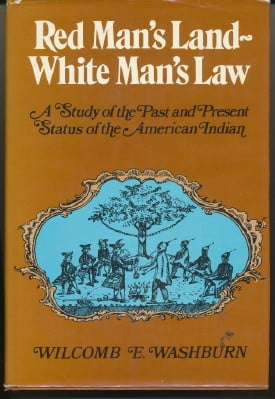In Red Man’s Land—White Man’s Law (1971), Wilcomb Washburn says he “hopes to describe” what he calls “the process by which the Indian moved from sovereign to ward to citizen.” (emphasis added) It would have been more accurate for him to have said it was the Christian Europeans thoughts and ideas that had “moved” “the Indian” in the White man’s mind, from one mental category (“sovereign”) to another mental category (“ward”), to yet another mental category (“citizen”).

Washburn’s use of the word “moved” in the phrase “the Indian moved” compares mental activity (the formation of thoughts and ideas) to a physical movement. Mental activity (the transition of a mental image from one category to another) is being thought of as if it were a physical movement. The imagery of the “Indian” mentally “moving,” so to speak, from one mental category (“sovereign”) to another (“ward”), is being compared or analogized to a physical movement of the human body from one location to another. All this is taking place as a result of Christian Europeans engaging in that mental activity.
Washburn could have written “Here’s how the Indian was moved: First, the Christian Europeans thought of “the Indian” as “sovereign.” Then they thought of “the Indian” as a “ward” of the government. And, thirdly, they thought of “the Indian” as a “citizen” of the Christian Europeans’ world. Washburn, in other words, was speaking figuratively when he said “the Indian moved” in the context of the above sentence.
When we think about it from our own Indigenous perspective, however, our free and independent Native ancestors were being mentally categorized in various ways by a foreign and invading people. With forty years of hindsight since Washburn’s book was published, we are now able to see that he was describing the mental transition from one category to another, while comparing that transition to a person walking, for example, from one room to another. The sense in which Washburn used the word “move” in reference to “the Indian” was as a movement in the mind and by means of the mind, or human consciousness, as a result of human thought.
Red Man’s Land—White Man’s Law rests on a key assumption: As soon as the Christian colonizers invasively arrived by ship, our free and independent ancestors and nations immediately, as if by magic, supposedly became, from the perspective of the White man, subject to the thoughts and ideas of the invaders. The book appears to assume that as soon as the Christian world became knowledgeable of the geographical location where our ancestors were living, that from that moment forward our ancestors were rightfully subject to the mental activity of the White man. Washburn spent no time explaining to his readers what our ancestors thought because he had no way of knowing. His book gives the impression that only the thoughts and ideas of the White man were important to the White man, which, actually, has always been true.
Perhaps the peculiar predicament we face today as Native people is that for many generations we have been living in and subject to the mental world of the White man, subject to his thoughts and ideas, his categories, and his vocabulary. And although we are able to think back to the time of our original free and independent existence, as the original nations and peoples of this continent, for most of us as Native people, the language of the colonizers is our sole means of communication because genocide made it impossible for us to have been raised speaking and communicating in our own Native language.-Steven Newcomb